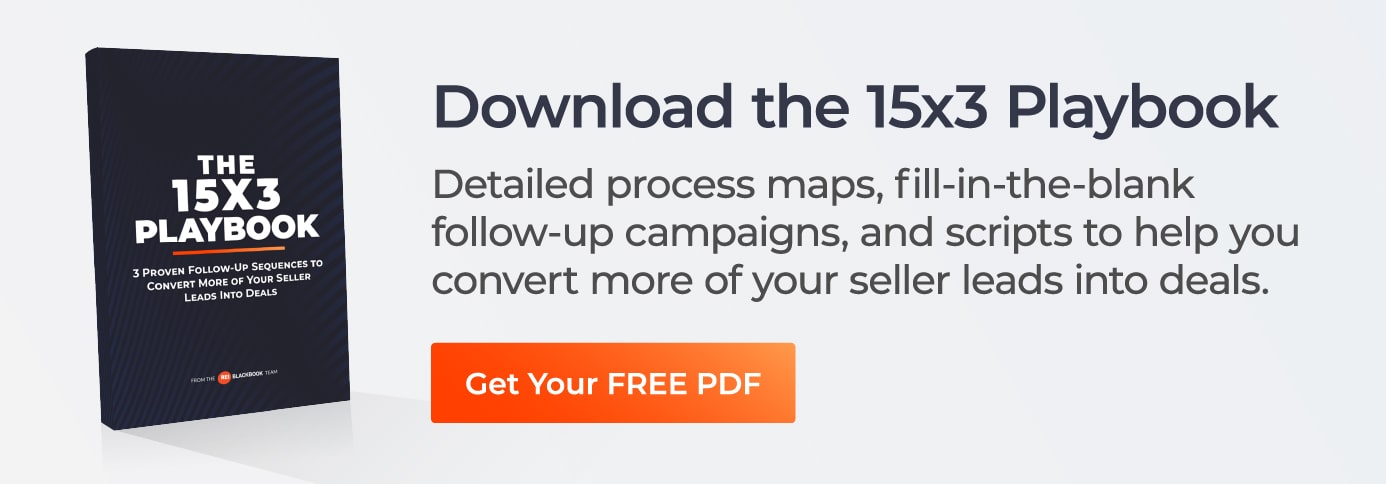CHAPTER
08
Generate High Quality Motivated Seller Leads In A Hurry with Google Ads
Google Ads is another type of paid online ad you can use to drive highly motivated seller leads to your website.
Google’s online advertising platform allows you to create online ads to reach people exactly when they’re interested in the products and services that you offer.
For example, if someone opens Google and types in the search term “Sell My House Fast”, you have the ability to place your ad at the top of their search results.
Chances are that you’ve seen one while you were googling something yourself.
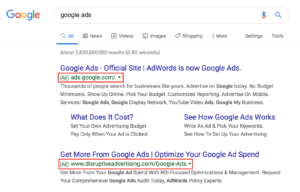
Just like Facebook Ads, Google Ads can be termed as “pay per click” (PPC) marketing, which simply means they are a method of direct marketing where you pay (auction or bid style) for every click over to your chosen URL (website).
Since you are paying for the ads you can determine who the audience is that will see the ad, and the audience will be the people who need your services.
Out of all the marketing methods available, you may be wondering why you should use Google Ads.
Google Ads is one of the best ways to generate high-quality seller leads for your business because the prospect is initiating the contact with you.
What that means is, someone is going out of their way to open Google and type a search term like "Sell My House Fast".
They see your ad, click on it, and fill out the form on your website.
This is a person who is actively searching for a solution to their problem, and that is why they are such valuable leads.
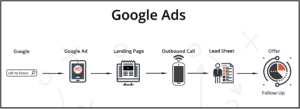
Here’s what you’ll need to get started with Google Ads.
- Keyword Research:
- Use phrases that motivated sellers are actually using to look for services like yours.
- Google Ad:
- You will need to create an Ad for your business that will show up when people search for services your company offers.
- Landing Page:
- Drive leads to a landing page explaining what your business does, and how you can help those leads, so you can capture leads 24 hours a day.
- Trackable Phone Number:
- Use a unique phone number on your site so you can track which inbound calls are coming from your online marketing efforts. You can also make outbound dials and track which calls are answered, and create automated text & ringless voicemail campaigns for those that were not.
- Lead Sheet:
- Leverage the lead sheets inside REI BlackBook to input the data you have collected from your prospects. Simply type in their information, and REI BlackBook does the rest. The property is automatically entered into your Property Pipeline, and your new lead is simultaneously entered as a new contact.
Use this lead generation method if you…
- ...need leads now - you can see results the instant you turn on these ads.
- ...have a marketing budget - you can control how much you spend, but to do Google Ads at a scale, you’ll need your wallet.
- ...are tech-savvy - Google Ads definitely has a learning curve. You’ll need to be pretty tech-savvy or plan on bucking up to hire an agency or freelancer to do it for you.
NOTE: Many of our users who are having success with Google Ads are doing so because they’ve partnered with Dan Barrett and his team over at Adwords Nerds. You can learn more about their services and book a strategy session here.
Like every other marketing method there are Pros and Cons to Google Ads.
Pros
If you’re a real estate investor you have a lot of marketing options available to you. So why Google Ads?
- Leads are highly motivated because they are intentionally going online to search for a solution to their problem.
- Gain leads “instantly”. We say “instantly” because ultimately conversions depend on your website, your campaign being properly setup, and your budget.
- You can quickly and accurately measure your ROI (return on investment).
- You can get started for under $1,000, and take it from there.
Cons
- Your CPC (cost per click) could range from $15-$75+ depending on your market and campaign setup.
- If you're running your own ads, there can be a steep learning curve. You will want to know the ins and outs of the Google Ads platform enough to improve your conversion numbers and reduce your cost.
- Results are probably less "trusted" than organically shown results, and you'll need a good website or landing page to drive traffic to, otherwise it's a waste.
Why Google Ads For Real Estate Investors
Google ads are one of the most effective marketing strategies for real estate investors, but before you get started, you have to make sure your business is ready to capture and convert these leads.
Since a click to your website can cost $15 - $75 dollars and leads can sometimes cost hundreds of dollars, you don’t want these falling through the cracks.
Not to mention, they are more valuable leads than those from direct mail, bandit signs, and even Facebook ads.
Again, think about how they are getting to you.
Someone has to go out of their way to open Google, type in a search term like “Sell My House Fast”, click on your ad, and submit their details.
In this scenario, they are initiating contact with you, not the other way around.
And you’re probably not the only company they are talking to, so the longer it takes you to reach out and contact them, your chances of closing that deal greatly decreases.
Here are some of the major benefits of Google Ads in more detail...
Instant website traffic: as opposed to SEO, you can start driving traffic to your site with Google Ads today. One major benefit is that if you absolutely need leads (like, right now), you can start driving traffic to your website and collecting leads (assuming you have a good website, and are targeting the right traffic, and running the right ad).
Extremely measurable stats (even for beginners): even if you’re a newbie, the Google Ads platform will provide data, and explanations of what each piece of data means. Google will break down in a simple, visual way, how much each click is costing you, how many people have seen your ad, etc.
Quickly determine ROI in your market: one major benefit of running a Google Ad, is that you can quickly determine it’s ROI (return on investment) in a short amount of time. In maybe 1 month (shorter or longer depending on your budget, ad content, and campaign setup) you can get a fairly good idea of how much it costs you to get a lead from paid advertising. The Google Ads platform will show you stats like: $25 per click, $250/lead. You then can measure how many of those leads end up converting. If a lead costs you $250, and it takes 10 to convert, then you’re getting a closed deal for every $2500 you spend. If that makes great profit, then double down on these ads (because they’re sure to end up costing more as time goes on).
They can be improved over time: another benefit is that after you’ve figured out an ad set that brings you leads on a regular basis, you can go to work making it more efficient. Finding out things like what headlines convert better, what landing page layouts convert better, and more. By tweaking your ad content, audience, budget, campaign, and landing page, you can either raise or decrease the cost of each click or lead (within reason).
You can know the exact audience you want: with marketing channels like SEO, you can’t really know what kind of traffic you’ll end up driving until after the fact. For example, analytics may tell you basic demographics about who is finding your website organically, and what search phrases they typed to get there. And that’s great, but with Google Ads, you can essentially say, “only show this ad to the demographic I want.”
As we mentioned earlier, Google Ads are paid per click to your website, so it’s important to understand how this process works.
Understanding the Bidding Process for Google Ads
Google Ads hinge on a crucial thing: a bidding or auction system.
Here’s how it works:
- There are people who go to Google to perform searches for all different types of products, services, and answers to questions.
- There are multiple companies that want to pay to get in front of those people (ABC Corporation, you, and another small business).
- Therefore there is a bidding war to see who will pay the most. For example, ABC Corp. is willing to pay $50/click to get in front of motivated sellers, so unless you bid $50.01, your ad will show up below theirs
This is a bit extreme, and it’s a bit more nuanced than this, but the point is that it all works on a bidding system. Because real estate investors stand to make $10,000 to $30,000 or more per deal, the competition for Google Ad leads is steep.
As long as you know your numbers, this shouldn’t scare you.
For example, if you know you make an average of $12,000 per deal, then you should be able to spend $2,000 - $4,000 to acquire a deal using Google Ads.
Don’t forget, any lead that you capture that doesn’t close right away, can be automatically followed up with over a long period of time.
That means you can convert those cold leads into deals on autopilot using REI BlackBook long term drip Workflows like Marcy Martinez's power workflow used to turn dead leads into deals.
Google Ads is a very popular traffic source for serious investors, and you should plan on spending $25/click or more depending on your market. Again, none of this should matter as long as your profit from a closed deal far outweighs the cost of the ads.
It’s time to set up your Google Ads Campaign.
How To Run a Google Ad Campaign
Name Your Campaign
When starting a Google Ads campaign we typically recommend you name the campaign on a very broad idea of what the campaign’s focus is, and then the location it targets.
For example, if you’re a Philadelphia-based real estate investor, and running a campaign in the Philly area, call it something like “Motivated Sellers – Philadelphia”.
Set Your Parameters
No matter who you are, you’re not advertising to every person in the world. So now it’s time to start filtering your campaign and being specific about who you want to target.
With Google, you’ll start filtering search phrases. You only want to target users who type in certain phrases. For example, you probably wouldn’t want to get in front of people searching, “Philadelphia realtor”, because it’s fairly clear that those searchers are likely looking to sell on the MLS, and are not interested in your solution.
“Sell house cash Philadelphia” on the other hand, is exactly the type of niche search phrase you’d want your ad to be shown for. Google give you the ability to narrow down by keywords or phrases, so you’ll want to start building your base keywords.
Aim for a dozen or so (to start with) and keep them fairly generic. For example, the phrase, “sell my house” is essentially the same phrase as “sell my home”, etc. So think broadly at first. Come up with broad keywords you want to be shown for, and then over time you can add in more specific variations of them.
Not sure which keywords to use? Check out this Motivated Seller Keyword Report for 2019 Dan Barrett and his team put together.
Use that Base List as The Names of your Ad Groups
After you pick out keywords that are similar, you can put them all in the same ad group, and name that ad group after them. So in our example, if you found the keyword “sell my house”, you can put it in an ad group named “Sell my house”.
Add Keyword Variations
Working one ad group at a time, now we get fiddly. In case you’re not familiar with the term, it means that we’re going to tinker around, adding more phrases to your ad groups, and tweaking some things.
So in our example, go inside your “sell my house” adgroup, and add all the keywords that could be close variations of this (the phrases we told you to leave out earlier).
So add things like, “sell my home”, “sell your house”, “sell my home”, “how do I sell my house”, etc.
You can add as many variations as Google suggestions, or you can think of.
Add Support For Keyword “Types”
It’s important to understand that Google handles keyword in different ways. For example, what if you only want your ad to get shown when someone types in “sell my house” exactly in that word order, with nothing added to it? Or, what if you want your ad to be shown if someone types in “help me sell my house”?
Google handles these distinctions through keyword “types”.
So take all your keywords and copy them into the following match types: phrase match, exact match, modified broad match. You should run those 3 versions of each keyword within the same ad group.
- "Phrase Match" - Only triggers when someone types in exactly what's in the quotes, but they can addd stuff before and after.
- Example: "sell my house"
- Triggers when someone searches for:
- Sell my house fast
- I want to sell my house
- Sell my house in Nashville
- [Exact Match] - Only triggers when someone types in exactly what's in the brackets, nothing more, nothing less.
- Example: [sell my house]
- Triggers when someone searches for:
- Sell my house
- +Modified +Broad +Match - They must search for the words with the + signs, but in any order, and can add stuff before and after.
- Example: +sell +my +house
- Triggers when someone searches for:
- Sell my ugly house
- Sell my house in Skyrim
- Wife wants to sell our house
Essentially, this is going to let you measure which ones convert better, measure the different CPC (Cost Per Click) of each, and more. It’s important that you’re measuring each type of keyword differently.
Build Your Ads
OK, now that you have your campaign created and named, your ad groups named with keywords and keyword types populated, it’s time to build your ads.
Your ads are the actual words / media that are going to get shown to people when they search.
Build (at least) two different ads per ad group. As much as you can, make sure the ads contain the keywords as this will BOLD them in the ad text on the search results page.
So in our sell my house ad group, an ad might read something like “Sell Your House in 7 Days” or “You Can Sell Your House for Cash”. Notice how each of these ad headlines contain natural variations of the base keywords.
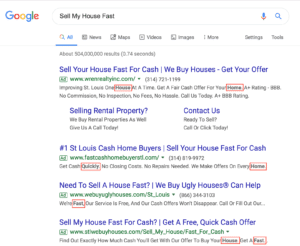
Other Setup Instructions
Besides the basics of creating a campaign, you can also run ads only to searchers within the metro area you’re targeting, or the State, or the entire U.S. For example, it may benefit you target searchers from across the U.S. when they query “sell house fast for cash Philadelphia” because maybe they have a vacation or rental property they want to sell, even though they live in Florida.
Also, make sure you’re measuring your results, capping your ad budget (so you don’t overspend) and monitoring your campaign daily. You’ll have to be fairly involved to check data, pause what’s not working, etc.
For some guidance on check ins for your ads check out The “Big 5” Weekly Check In.
One Last Consideration: Your Website (REALLY) Matters
Now that you’ve been flooded with information, there’s one last very important thing you have to keep in mind:
If your ads drive all the traffic in the world, but your website does not inspire trust or is not ideal for conversion, you’re going to throw money down the drain and lose opportunities.
Paying to get people onto your site does you no good, unless those people trust you enough to submit their info for a cash offer. If you want to build your own amazing site, use one of the templates inside your REI BlackBook account. As your customizing your site refer back to the SEO chapter to ensure you have a fully optimized website.
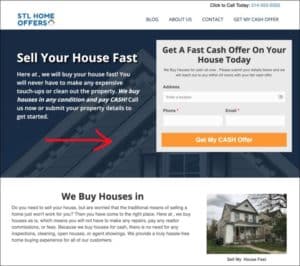
Do keep in mind that since Google is the biggest search engine, you’ll end up spending a bit more money. However, if you have the budget for it, investing in Google Ads also means that your visibility can hit a record high and that you have a bigger pool of people you can reach, according to your target settings. Which in turn can drive loads of real estate leads every month to your website.
A Note from the REI BlackBook Team:
If you still need assistance there are additional resources out there to help. Reach out to Dan's team at Adwords Nerds, or check out the Google Ads Accelerator where Dan Barrett himself will teach you how to build your very own Google Ads Campaign.

